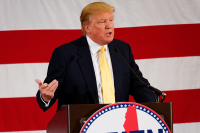As of late, there has been a surge of controversy concerning the idea of “fake news,” or the concept of the mainstream media purposefully reporting inaccuracies and exaggerations. Unfortunately, the general public has little choice regarding what they are reported, aside from their preferred choice of broadcasting network.
Simply put, the vast majority of American citizens do not have the time in their daily lives to constantly be fact checking their news sources. They are too busy being students, workers, parents, etc. They are forced to either adopt a healthy amount of skepticism for every news story they are told, or place their blind faith into a corrupted system. Instead of accepting this new “truth is perception” stance, some companies are taking a stand to help the American public trust its media again.
Facebook, originally more of a social media website for a younger generation, has now shifted its demographic to an older audience, focusing on reporting news stories online, mainly political and secular news. However, quantity does not always equate to quality. Facebook has some of the highest amounts of fake news coverage on the internet.
According to the American Press Institute, only 12 percent of Facebook users place a great amount of trust in Facebook’s news coverage. This is to be expected, since Facebook posts such a large quantity of articles, but the creative minds managing the site have seemingly found a way to combat these false stories.
Similarly to how YouTube began enlisting the help of its users to subtitle, flag and otherwise manage their favorite videos from a user perspective, Facebook is now entrusting their users to mark down articles they believe stray too far from the truth to attempt to better their site’s reputation.
According to Forbes magazine, after a user has marked said article an “independent fact-checking organization, Correctiv,” will then verify the articles flagged. If Correctiv deems the article to be “fake news,” then it will be given a “disputed” badge and be placed much further down the general user’s news feed.
Before coming to the United States, the program will have a trial run in Germany. Due to the upcoming German presidential election, Facebook will have clear evidence regarding whether the removal of false articles has any impact on the nation’s future political climate.
The idea behind Facebook’s initiative to rid their site of “fake news” is both altruistic and valiant. Wanting the country’s general public to be informed and educated is an admirable goal. However, I believe there will be several bumps in the road before the process becomes functional.
One major problem I foresee is the corruption of the process, meaning that instead of tagging what is actually “fake news,” users will tag articles that they have not bothered to fact check themselves, or tag articles that do not align with their opinions. This could perhaps lead to Facebook again following in YouTube’s footsteps by appointing official news checkers, instead of allowing all of their users the power to flag articles.
While the inclusion of Correctiv will halt these people from completely breaking the system, employees of the fact checking company are going to be incredibly busy for the first few months after the start up of the program in the United States.
Though the initiative is still fairly new, Facebook has not released any of their current plans to form the fact-checking company. One has to wonder if the company’s employees will be able to keep pace with the flow of flagged stories during the initial months.
Another potential issue is that the badge will be rendered ineffective as time goes on. Though the “disputed” badge will seemingly be proof of the article’s lack of validity, who is to say that people will not share the article anyway?
One thing this election has proved is that some Americans do not value the truth, blindly throwing their support to whoever is in their political party. The badge could also potentially become a “badge of honor,” making martyrs out of liars who could then claim that their voice was being “silenced” by Facebook, when in reality the story was pulled because it was factually incorrect or too biased.
Basically, the concept of marking “fake news” could backfire magnificently. Instead of burying these articles in users’ news feed, people will actively seek out the stories with the “disputed” badges.
Finally, there is the matter of the trust that users place in the hands of Facebook and its employees. We live in a time where it could be dangerous to place so much faith into a major corporation. Facebook claims that its initiative is to prevent false stories from circulating on their site, but what if their true intentions are more self motivated?
Facebook is one of the largest and most powerful companies in present day. As of today, Facebook has not been involved in major controversial issues, but if someone were to challenge the social media site, who would come out victorious?
Censoring media is a slippery slope, no matter the cause behind it. After all, the road to hell is paved with good intentions.
In short, the idea is not the problem. In fact, I firmly believe that if this program runs smoothly, more major websites may hire their own independent fact-checkers. However, this plan has just emerged from its blueprint phase and there are bound to be some glitches in the system.
The American public should be cautiously optimistic and do their part by continuing to fact-check the news they hear until these programs are fully operational.
Briana Scalia, FCRH ’20, is a journalism major from Long Island, New York.





